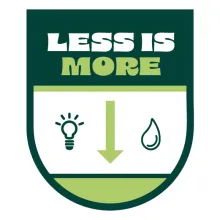Image

Using less means doing more for the environment.
Less is More is a utility reduction competition between dorms where residents work to conserve electricity and water throughout February. Glory and prizes go to the dorms that conserve the most!
Click below to sign the online pledge to reduce and you could win a $100 Amazon gift card!*
Here are some ways you can choose to use less & decrease your impact on the environment - during Less is More & always!

Laundry
- Wash only full loads of laundry
- Wash clothes only when they’re actually dirty
- Reuse towels multiple times before washing
Kitchen
- Cook food in as little water as possible; this also helps retain nutrients
- Keep a pitcher of cold water in the fridge instead of running water until it cools down
- If you drop an ice cube, don’t throw it in the sink, put it in a houseplant
- Designate one glass for your drinking water for the day. This will cut down on the amount you have to wash
- Wash fruit and vegetables over a bowl and use that to water plants
- When you move off campus, only run your dishwasher when it is full
Shower
- Cut your shower time. Try to make it through in three songs!
- Turn off the water while you shampoo, condition, and lather up
- Avoid baths, which can use much more water than a short shower
Bathroom
- When washing your hands, turn off the water while you lather your soap
- Turn off the water when shaving or brushing your teeth
- Don’t use the toilet as a garbage can—you’re wasting a flush. That’s up to 5 gallons of wasted water!
- When adjusting water temperatures, turn down the water flow instead of turning it up. If it is too hot, don’t crank up the cold water, turn down the hot
Miscellaneous
- Buy linen instead of cotton. Cotton is a very thirsty crop!
- Eat more plant-based meals
- If you see a leak or constant drip, report it to maintenance
Avoid recreational water toys that involve a constant flow of water

Kitchen
- Wash only full loads of dishes
- Don’t use disposable plates, cups, or silverware. So much energy is used to produce and ship these items, only to be thrown away. Reusable versions, in the long run, use less energy!
Sunlight
- Use natural light during the day
- When it is cool outside, open your blinds or drapes to let the sun help warm the room
Climate Control
- Use fans instead of cranking your AC (be sure to turn them off when you leave!)
- Two up, two down; turn your thermostat up two degrees in summer, down two degrees in winter
Efficiency
- Use LED lights instead of incandescent bulbs
- Buy Energy Star-rated microwaves, fridges, and other small appliances; they are more energy-efficient
Laundry
- Wash only full loads of laundry
- Wash clothes in cold water - much of the energy used to wash clothing is used to heat the water, not run the machine (up to 90%)
- Separate wash loads into light and heavy fabrics so you can cut down on drying time for the light fabrics
- Consider hang-drying your lightest fabrics
- Clean the dryer lint filter every time to promote efficiency
Showers
- Shorten showers. It not only saves water, but it saves energy used to heat the water!
Electronics
- Consider investing in a laptop—they use less energy than a desktop computer
- Unplug your phone or laptop as soon as it is fully charged; this will save electricity and your battery life
- Only replace your phone or other electronics when they are broken, not because your contract is up
- Plug electronics into a power strip. Then you only have one switch to flip when you leave and you won’t be losing vampire energy!
Food
- Buy local food—it has used less energy to get to you
- Eat more plant-based meals
*Pledge open to current U of A Housing residents only. Entries are accepted only during February. You do not need to sign the pledge to participate in Less is More, but you will not be entered into the drawing for prizes.

